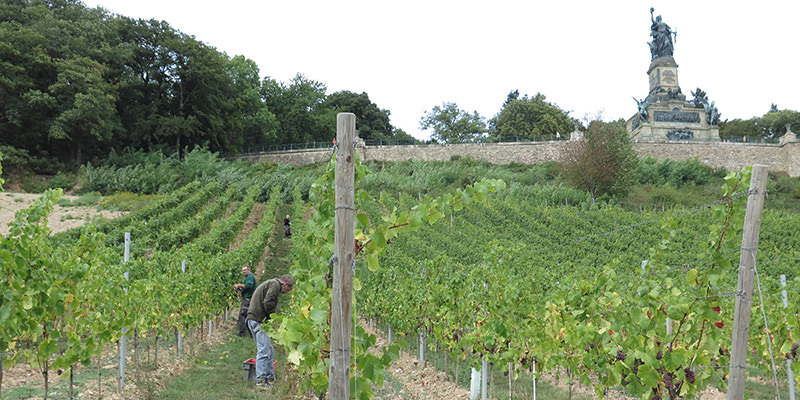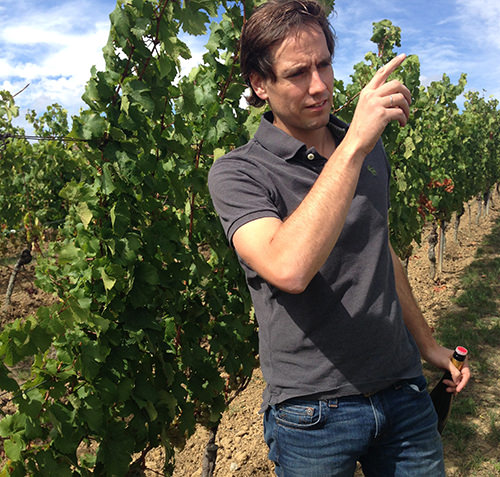
For most of us, the associations that come to mind when we think of German wines are immediate barriers to actually drinking them: “sweet,” for example, or perhaps “complicated classification system,” or probably, if you’ve ever stared at a bottle that says, “Trockenbeerenauslese,” the words “confusing label” might come to mind. Sommeliers have long loved Riesling, but these complexities, as well as a fear that all Riesling is sweet, have staved off many drinkers.
But right now, all of that is changing, and it’s happening alongside a veritable quality revolution that’s been brewing over the past few decades. Many producers in Germany who once made inelegant, bulk wine have started to look carefully at the beautiful, hilly land around them, and decided to switch gears so as to showcase the potential of that terroir. That means less emphasis on mass-produced wines and sugar-laden wines, and a new focus on dry Riesling made from smaller parcels of land with lower-yield vineyards. Also, there are some great producers making organic, even biodynamic wines, which approach grape growing holistically and organically.
German winemakers realize that they need to clarify their labels, as well as their classification system. That’s part of the motivation for using a somewhat new system called the “VDP,” which stands for Verband Deutscher Prädikats- und Qualitätsweingüter – thank God for abbreviations, right? Essentially, it’s focused on the actual place where grapes are grown, meaning it’s about the terroir, which includes soil quality, climate, sun exposure, and other aspects that make grape juice taste awesome. There are levels of the VDP, starting with the most basic Gutswein, which just means all the grapes are estate-grown (as opposed to purchased); then there’s Ortswein, which means the grapes are from within one village; then there’s the Erste Lage label for premium sites, and the Grosse Lage label for the tippity top, best vineyards. The price goes up accordingly, of course.

On a recent trip to Germany, I was able to meet some of the original pioneers of the quality revolution taking place in Riesling production, as well as its newest visionaries. Peter Jacob Kuhn is a husband-and-wife team in the Rheingau that’s revered for pioneering biodynamic winemaking. Following in these footsteps, producers Georg Breuer and Dressigacker are leading the way toward better vineyards and more natural winemaking in the region; tasting their wines will likely convert you to an acolyte of German Riesling. Neither of them are officially part of the VDP system, partly because of bureaucracy and internal politics – but no matter, because they are still terroir-driven winemakers, without doubt. Theresa Breuer’s wines are some of the most elegant, beautiful, and pure expressions of Riesling in the Rheingau, and come from organic vineyards. Jochen Dressigacker, who is in the Rhinehessen, started converting his family vineyards to organic when he took over in 2001, and also shifted the focus away from sweeter tines, to elegant, dry wines. To create community amongst German winemakers who share his vision, he has formed a group of producers called “Message in a Bottle” that strives for healthy, lower-yield vineyards, which produce smaller amounts of wine but at a much higher quality. Keller estate is another leader of quality winemaking in the region, and is also involved in “Message in a Bottle.”
But as exciting as the current generation of winemakers may be, Germany is certainly not the only Riesling game in town. In Alsace, France, you can find somewhat weightier, dry Rieslings at great value. And domestic producers, most notably in the Upstate New York region of the Finger Lakes, have made great strides with the cold-hardy variety. Below are some of the most exciting producers out there, whose wines are available in the U.S. Pair these dry, crisp, high-acid wines with pork, pasta, cheese and charcuterie, or soup.
Recommended wines from:
Germany
Peter Jacob Kuhn Jacobus Gutswein 2014 ($20)
Georg Breuer Rhiengau Charm 2013 ($17)
Dressigacker Organic Rheingau Trocken 2013 ($18)
A few top quality Rieslings to try from outside Germany:
Alsace, France
Paul Blanck Classique 2014 ($18)
Francois Baur Herrenweg 2012 ($18)
